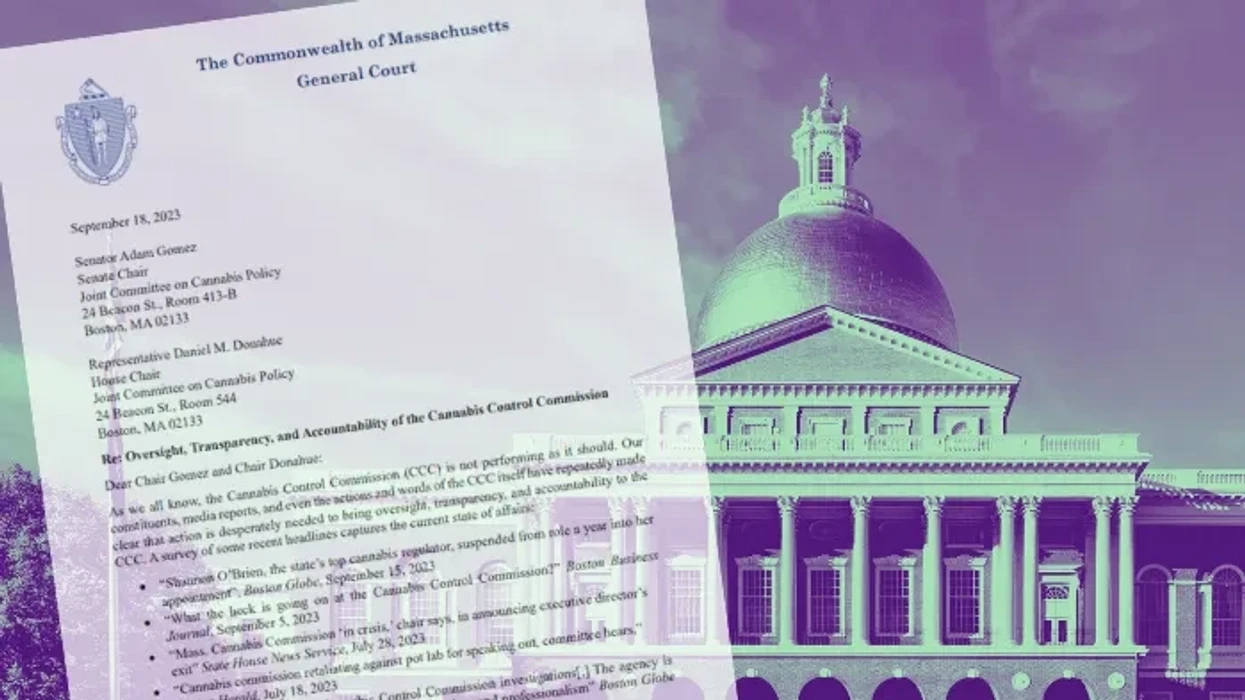By Chris Faraone, Talking Joints Memo. Reprinted with permission from Talking Joints Memo. .
“The public deserves some accountability on why these issues have proven so hard to stamp out, and what long-term changes the agency is making to get its work done with more transparency and efficiency.”
There has been endless drama around the Massachusetts Cannabis Control Commission over the past few months, all of which is only heightening in the wake of state Treasurer Deb Goldberg suspending the agency’s chairwoman last week.
The latest major news comes not directly from the Worcester-based commission, but rather from Beacon Hill, where a bipartisan group of five state lawmakers released a scathing letter to the chairs of the legislature’s Joint Committee on Cannabis Policy this morning.
The critique arrives a day before the House and Senate body meets on Tuesday for a hearing on bills ranging from An Act relative to cannabis use by first responders, to An Act relative to employment protections for medical marijuana patients, to An Act relative to cannabis research funding.
As the office of state Sen. Michael Moore, which released the letter, explained: “In light of mounting reports of scandal and dysfunction at the Massachusetts Cannabis Control Commission (CCC), five members of the Massachusetts Legislature today sent a letter to the Joint Committee on Cannabis Policy requesting an oversight hearing to bring better transparency and accountability to the agency. The effort, led by Senator Michael Moore, comes after the Chair of the CCC described the agency as ‘in crisis.’”
Furthermore, “the letter, signed by three Senators and two Representatives, asks for an oversight hearing that addresses seven primary points of dysfunction at the CCC.” They are:
-Suspension of Chair O’Brien; State Treasurer Deborah Goldberg suspended CCC Chair Shannon O’Brien, according to media reports. The Treasurer’s Office has so far declined to explain the suspension or name an interim chair.
-Ongoing Governance Issues; the CCC has been engaged in a series of closed-door mediation sessions over its governance structure since April 2022.
-Licensing Delays; opaque and lengthy licensing processes have become a frequent complaint to legislators’ offices.
-Extended and Overly Aggressive Investigations; investigators from the CCC have been criticized for operating in an overly aggressive and unproductive manner during site visits, with little communication to business owners about their investigation status or findings.
-Inadvertent Records Release; in spring 2023, the CCC allegedly shared a document containing the names, addresses, phone numbers, emails, and other sensitive personal information of every cannabis worker, active or inactive, in Massachusetts.
-Alleged Retaliation Against an Independent Journalist; CCC officials allegedly cited the content of a journalist’s testimony before the Joint Committee on Cannabis Policy as part of the justification for stripping the journalist of their press credentials.
-Sex Offenders as Retail and Delivery Operator Agents; following the passage of legislation in 2022, the CCC has proposed allowing registered sex offenders to become retail and delivery operators in the cannabis industry, positions that will allow them access to sensitive customer information.
Among their gripes, the authors of the letter notes how “the CCC has engaged in semi-regular executive session mediation,” writing: “As the public is excluded from executive session, the specific items discussed in the mediation, its progress and status are all unclear. … As the Open Meeting Law makes clear, these issues are not intended to remain behind closed doors forever, and ultimately are expected to be resolved publicly.”
Regarding the CCC’s process of impugning licensees, the letter recognizes how “investigations have also come under criticism for operating in an overly aggressive, unproductive, and untimely manner,” and asks, among other questions: “What are the CCC’s policies and procedures for conducting its investigations? How were these policies and procedures developed and what type of training does the CCC provide to its investigators?”
The letter also questions the agency’s decision to shut out blogger Grant Smith-Ellis, writing, “It is extremely concerning that the CCC finds itself leveraging the content of testimony before the Committee as part of the rational [sic] to exclude certain media oversight. Particularly since the journalist had testified in favor of legislation that would have created an independent oversight unit for the CCC. The chilling effect it will have on future testimony alone is enough to warrant action by the Committee.” Adding, “it is bewildering that an agency with a troubled governance structure, vacancies in several leadership positions, and issues in the licensing, investigation, and public records process would decide that an independent journalist doesn’t meet certain media standards rather than first addressing its own internal issues.”
“Since its creation in 2017, The Cannabis Control Commission has faced what sometimes feels like an endless stream of scandals. The public deserves some accountability on why these issues have proven so hard to stamp out, and what long-term changes the agency is making to get its work done with more transparency and efficiency,” Sen. Moore said in a statement. “Especially considering the 23% funding increase the CCC requested during FY24 budget negotiations, it is now more critical than ever that we make sure this agency has a plan to right the ship. Millions of our tax dollars are at stake – I am hopeful the Joint Committee on Cannabis Policy will schedule a hearing to get answers from the top brass at the CCC.”
Read the whole letter here.














 Union Square Travel Agency: A Cannabis StoreWill Ellis
Union Square Travel Agency: A Cannabis StoreWill Ellis The Flower Lounge at Union Square Travel AgencyWill Ellis
The Flower Lounge at Union Square Travel AgencyWill Ellis Union Square Travel Agency's New Dispensary Opens on BroadwayWill Ellis
Union Square Travel Agency's New Dispensary Opens on BroadwayWill Ellis Union Square Travel Agency designed by Leong LeongWill Ellis
Union Square Travel Agency designed by Leong LeongWill Ellis Union Square Travel Agency: A Cannabis Store designed by Leong LeongWill Ellis
Union Square Travel Agency: A Cannabis Store designed by Leong LeongWill Ellis Union Square Travel Agency gives 51% of proceeds to The Doe FundWill Ellis
Union Square Travel Agency gives 51% of proceeds to The Doe FundWill Ellis
 High-THC Weed Explored - The Bluntness Photo by
High-THC Weed Explored - The Bluntness Photo by  High-THC Weed Explored - The Bluntness Photo by
High-THC Weed Explored - The Bluntness Photo by  High-THC Weed Explored - The Bluntness Photo by Maria Fernanda Pissioli on Unsplash
High-THC Weed Explored - The Bluntness Photo by Maria Fernanda Pissioli on Unsplash 
 When it comes to pricing, cultivation methods matter - The Bluntness
Photo by
When it comes to pricing, cultivation methods matter - The Bluntness
Photo by